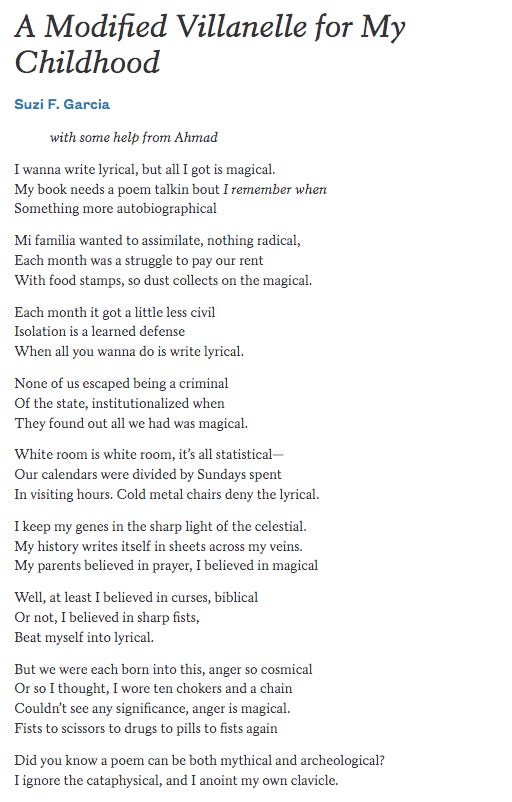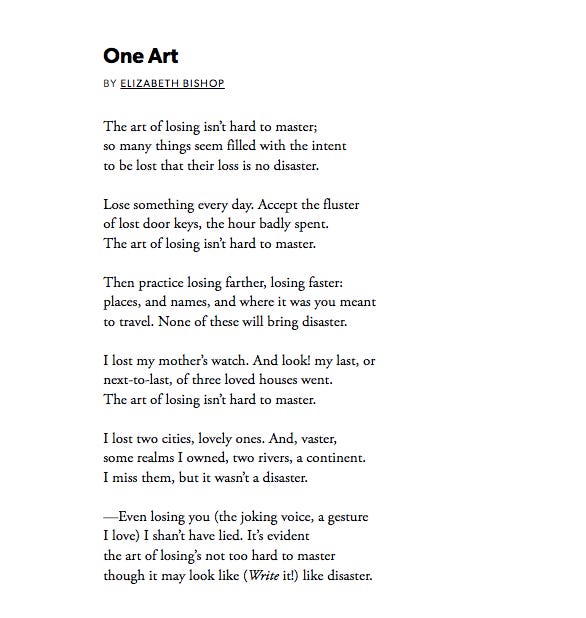
Last week, we were taken by
into the world of golden shovels (you can find that post here). Here was a poetry form that I had neither read nor tried before. And it turns out that it was fun. I was particularly drawn to using a lyric for my attempt, the blending of art forms felt expansive.Afterwards, I found myself restless for more. It wasn’t just the golden shovel form that I wanted more of, it was the learning mixed with the sense of achievement from trying something new. I realised that I would like to be able to read a poem and then say, “oh I do love a sonnet.”
gave us this welcome reminder:“Try not to worry too much about the end result - the joy is in the attempt!”
I realised that the main reason I don’t try out more poetic forms is simple: I find it hard. As a result, uncomfortable. And if I’m honest, not always that joyous. It is soooo much easier to stick with what I know. I get an idea for a poem and my hand starts racing, how much quicker to write in a practised style. Some of this makes sense - the feeling or the glimmer, the ‘thing’ I am wanting to capture sometimes feels elusive and slippery. Or I only have five minutes because I need to make dinner.
But I also know that this is no excuse. I can capture that initial impulse and return to ‘do the work’ of crafting. And the better I can craft, the more patient (and trusting) I am, the better chance of that whisp becoming something even more exciting or intriguing. How do I know what form the poem requires? Well I guess I need to know what the forms (the options) are in the first place.
And of course, not all poems arrive with gusto. Plenty don’t, they need cajoling and a form can help with this too, can’t it? As I have discovered with so many of the guest prompts we’ve had.
But yep, I still find it hard. And sometimes that steep learning curve and first attempt doesn’t actually bring me much joy. Sometimes the attempt of a new form brings me nothing but a big old dose of rip-it-up-and-start-again.
What happens then? Well, then I guess we have choices. No one is forcing us to write poetry (as far as I know). This isn’t a creative writing class, no one is judging or marking our work. I haven’t set myself lofty aspirations to be a poet laureate, so I think I can rest easy that I’m not diminishing the art of poetry writing by sticking with the handful of forms which are my favourite. Hmmm, but that golden shovel…
What if there is a form out there that I am yet to fall in love with? Meant to fall in love with even? What if one day there is a poem that I believe in so deeply it requires me wanting to get the form exactly right. The form that I’ve never explored.
I guess the point is, until you try, you never know. And being a curious type, I don’t sit comfy with the not knowing.
Hard does not always equal fun. Too hard can actually end up being the exact opposite of fun. I am determined not to fall out of love with poetry writing because it has turned into a drag. Personally, my playing and finding pleasure and purpose in writing comes first because I know if I have that, the rest will follow more easily. There’s definitely a balance to be had when you are keeping joyful practise in mind.
But I also know that hard does not have to mean joyless or fun free. Yes, fun can come when you stop expecting an end result altogether. Entirely. Mess around and play and laugh at the attempts where you struggled to get it right. Not just pretend to not want an end result (side eyes). Anyone else find this pretty difficult? I watch my kids and they do it so well but me, less so. And likewise, I recall that joy does come from the end result that has taken you hours and hours to get right, as well as the process, and that can be the motivation required to keep going. There is huge satisfaction found in the right word that took days to surface. The right form that took a while to master?
The right amount of hard, hmmm, well that is worth a punt, no? Because otherwise I am turning my back on all these other opportunities for play and fun and developing my art that I don’t even know might exist yet. Not to mention that understanding form as a reader can also bring joy - when you read a poem so beautiful, so on point, where the form just sings you cannot help but want to understand the instrument being played. Not necessarily because you want to play it but because it helps you to appreciate it, because it helps you to discover more of it.
So yes, I am determined to develop my craft in terms of trying new forms. And yes this will undoubtedly be a little hard. But add in some other writers to learn alongside (ahh yes, thank you). Top up with a little humour along the way. Be considerate of time - “ten minutes then we’re done, pesky haiku”. Some grace - “of course this golden shovel will be dodgy, I’ve never written one before.” Be ready to admit that not every form will be for me. A certain form might not bring any joy. Ever. That I’ll try it enough times to know that it is just a pain in the ass. Then I’ll move on.
Remembering that there is absolutely nothing wrong with just enjoying what you enjoy. With reading and writing the poetry you know you like to read and write.
While at the same time being unafraid to admit that I am an absolute beginner. This week I heard someone read a villanelle out loud. You know that poetry form that I sense most poets know (?) but I still think of as the female assassin in Killing Eve (the Netflix series/book. Anyone watch it? Oh my goodness she was so good…sorry got distracted there for a second). It sounds like a form that might be sexy, dark, mysterious (am I still on tv thrillers?) It tempted me.
I started reading about refrain lines and patterns and I almost switched off. I almost thought, nah, too tricky. And then I stopped myself.
Could I? Might we….
Your writing prompt this week:
Of course you know where this is going.
It’s another form that I have never tried before so I started off by doing a little research. If anyone has written a villanelle (or has a favourite) and wants to share it in the comments then that would be great.
For those of us who haven’t, the villanelle form is (apparently) a French verse that traditionally contains three-line stanzas before a final quatrain, ending on a powerful last line in the final stanza.
This piece from The Poetry Place (Write Better Poems), has a good explanation of what a villanelle is and how to write one. I also liked this suggestion at the bottom for getting started:
First, find a topic. If you don’t already have this, here are two possibilities:
—Something that recurs or has recurred in your life. This could be a situation, a thought or feeling, a life event (birth, love, death), or maybe a physical object.
—A subject that can be looked at from multiple angles or through different examples (like the way Bishop explores different kinds of loss in “One Art”).
One Art by Elizabeth Bishop c/o The poetry Foundation
I also found this video by poet Josie Alford, which I found helpful if you’d prefer to watch:
And this is another powerful example of a villanelle I found - with the form adapted to suit the needs of the narrative:

A Modified Villanelle for My Childhood by Suzi F. Garcia, found via Poets.org (where you can read it more easily).
Aren’t they wonderful? That lure of the killer last line.
Who will be writing a villanelle this week? I’m willing if you are..
Nelly x




Oooh.... You're making poets out of us Nelly!!! 😂 Looking forward to trying this one, and I too can only ever think of Jodie Comer when it comes to a Villanelle but I'll try to not let that get in the way.... 😂
Ooooh! I love villanelles. I've been feeling a bit of summer sluggishness and needing some inspiration. I was thinking a return to some closed forms might provide the structure I need to get back on track. Just the nudge I needed. Thank you, Nelly! And here's a link to a villanelle I wrote while back. Or it's mostly a villanelle. I take a few liberties. You can't always follow ALL the rules: https://open.substack.com/pub/connort/p/a-song-for-sunday?r=dvsrv&utm_campaign=post&utm_medium=web